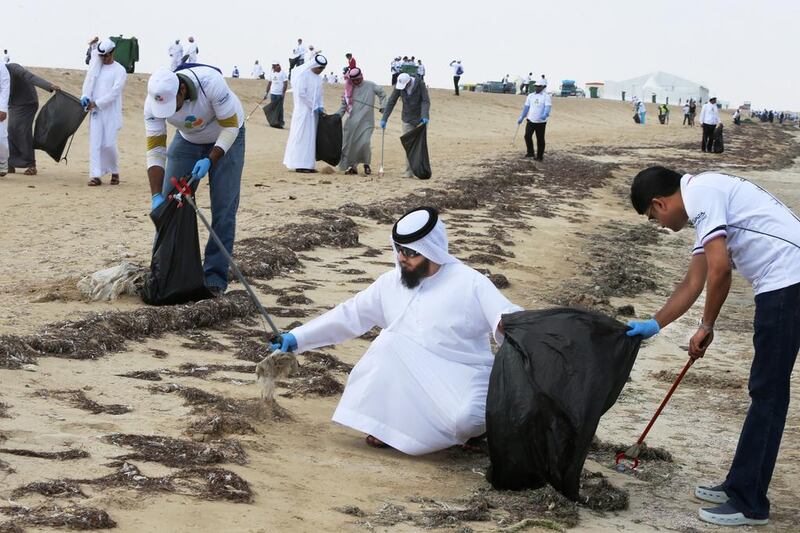ABU DHABI // A dolphin carcass, tyres, wood, broken pipes and hundreds of used tins were just some of the rubbish collected in a clean-up of three beaches.
Hundreds of schoolchildren teamed up with government employees for the “Waste Free Environment” event.
About 700 people took part at Hameem, with about 900 at Sweihat and Al Gahsha beaches in Al Gharbia on Thursday.
“This is the first time I took part in such a drive and enjoyed it and learnt a lot about the environment,” said Emirati Aisha Rowahi, 12.
“I collected juice bottles and plastic bags that were thrown in the desert. By cleaning the beach I would like to tell people to avoid polluting the sea and deserts and protect the environment,” said Aisha, who is a pupil at Al Murooj Scientific Private School in Abu Dhabi and was on Hameem beach.
The drive was aimed at boosting awareness about protecting the environment and to discourage people from disposing of rubbish irresponsibly.
“People enjoy fishing, having a barbecue and watching flamingos, but sadly they leave too much waste that harms marine and desert species,” said Omar Tariq, 15, also on Hameem.
“I found too many dead fish, plastic shopping bags, cans and rotten wood and small tyres.
“When the wind blows them to the sea, it affects marine species, particularly turtles and small fish who then suffocate to death as it clogs breathing when swallowed,” said Omar, who is a pupil at Sheikh Khalifa Pakistan school in Abu Dhabi.
Popular at the weekends, Hameem beach is about 60 kilometres from the capital and close to Al Dhafra.
People travel there to relax, fish and swim. The carcass of a dolphin was also found and clean-up volunteers urged those who fish on the beach to take their rubbish home.
Nizar Mouhanna, the sales marketing officer at the Hilton hotel in the capital, was there with a team from the staff. He said many people discarded their rubbish without thinking about the environment.
“The place is very nice. Many people during the weekends gather here for fishing and discard rubbish all around the place,” he said.
Rama Halboni, 12, a Jordanian pupil from Al Murooj school, said she learnt a lot from the clean-up operation.
“I learnt how to dispose of rubbish properly in green or black boxes and not to throw it outside because it can affect animals in deserts and fish in the sea. I found dead fish too.”
The clean-up was initiated by Borouge, a company affiliated with Adnoc and involved in the manufacture of plastics.
According to Borouge, more than 35,000 tonnes of waste is generated in Abu Dhabi every day and the solid municipal waste generation per capita is 1.5 kilograms a day – significantly higher than countries in western Europe.
According to the Gulf Petrochemicals and Chemicals Association, which had overall responsibility for the clean-up drive, about 33 per cent of the 80 million tonnes of waste generated in the GCC countries each year is plastic waste.
And less than 10 per cent of plastics are recycled in the Arabian Gulf region.
Craig Halgreen, vice president of corporate sustainability at Borouge, said: “Besides the negative impact of these plastics on recycling, oxo-degradable plastics tend to encourage indiscriminate littering because people believe these plastics will disintegrate within a short period of time.
“But the remaining plastic particles never totally disappear and retain the potential to cause harm to the environment.”
Mr Halgreen said the area attracted many residents at weekends.
“It is calm, quiet and away from the city.”
He also urged people not throw waste, but to collect it in a bag and drop it off at designated places.
“Today we found a carcass of a dolphin on the beach and big lorry and car tyres dumped here, and plenty of plastic bags and cans,” Mr Halgreen said.
Eisa Saif Al Qubaisi, general manager of Tadweer, the centre of waste management in Abu Dhabi, also urged people not to drop litter at the beach.
“Littering is one of the major threats to the UAE’s fragile desert and marine ecosystems. Through this clean-up drive we focus on our collective responsibility to protect our environment.
“The responsible disposal of litter is up to every citizen.”
The Waste Free Environment event was held to mark UAE National Environment Day, which took place earlier this month.
anwar@thenational.ae





